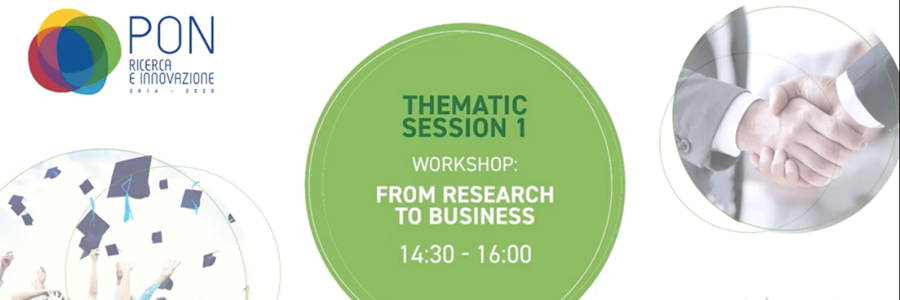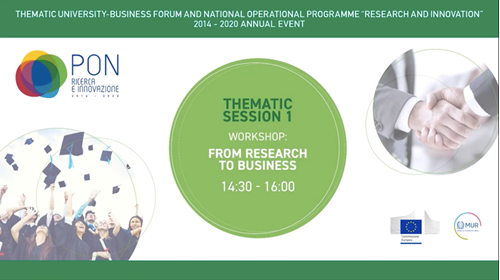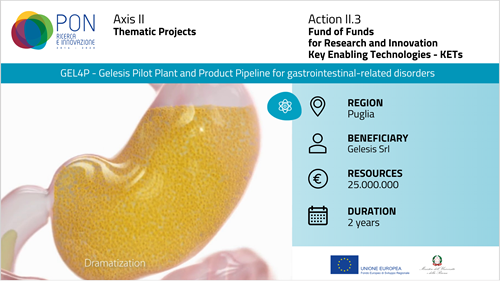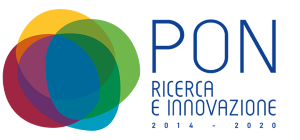A report of the workshop held on the NOP Research and Innovation annual event

ITA | ENG
How difficult is it for a researcher to get his or her ideas out of the academic world and into the business world, in order to have a real impact on production? This is the real challenge for our university system which was the focus of the workshop entitled “From Research to Business”, held on 22 February 2022 as part of the NOP Research and Innovation annual event 2021 organized in collaboration with the University Business Forum. The aim of the workshop was to present best practices adopted across Europe for the implementation of the “Knowledge Triangle” that brings together Higher Education, Research and Business.
 The workshop was moderated by Gabriella Colucci, President and CEO at Arterra Bioscience S.p.A., who presented the project carried out by Gerarda Fattoruso, a PhD student from the University of Sannio and funded by the NOP Research and Innovation 2014-2020 under Innovative Industrial Doctorates - Cycle XXXIII. The project entitled “Analisi Multicriteriale a supporto del sistema di controllo organizzativo nel settore dell’automotive” (Multicriteria Analysis to Support Organizational Control Systems in the Automotive Sector) was conducted in close collaboration with University of Sannio, University of Portsmouth and Stellantis Group. Continuous dialogue and sharing of ideas, which strengthened the confidence between the players involved, led to a true integration of knowledge, resulting in effective technology transfer and a positive impact on competitiveness.
The workshop was moderated by Gabriella Colucci, President and CEO at Arterra Bioscience S.p.A., who presented the project carried out by Gerarda Fattoruso, a PhD student from the University of Sannio and funded by the NOP Research and Innovation 2014-2020 under Innovative Industrial Doctorates - Cycle XXXIII. The project entitled “Analisi Multicriteriale a supporto del sistema di controllo organizzativo nel settore dell’automotive” (Multicriteria Analysis to Support Organizational Control Systems in the Automotive Sector) was conducted in close collaboration with University of Sannio, University of Portsmouth and Stellantis Group. Continuous dialogue and sharing of ideas, which strengthened the confidence between the players involved, led to a true integration of knowledge, resulting in effective technology transfer and a positive impact on competitiveness.
The aim of the project was to develop and implement innovative methodological tools to be applied to the decision-making process in order to improve accuracy in critical situations and increase the quality of control systems. The prototype developed, based on a new mathematical model able to analyse complex problems, is characterized by great flexibility of application and can provide ad hoc answers according to different needs. This characteristic makes it an effective tool in various phases of the decision-making process and in different contexts that go beyond the automotive sector. The idea is to propose a user-friendly mathematical model that can be easily integrated into specific business processes and that can be extended to the public sector. The project has received several awards for its innovation and competitiveness and a startup is due to be launched later this year.
Other virtuous university experiences were presented by Gianluigi Franci, University of Salerno, Coordinator of several projects supported by the NOP Research and Innovation 2014-2020 in the field of biology. “During my career, I have had many opportunities to understand what innovation in industry means,” Franci explained. “It all started in 2010, when I won the Start Cup competition of the Campania Region. From that moment on, I began to understand that the idea is the first step in creating something new, but the team, being ‘in time to market’ and customer acquisition strategies are as important.” Franci presented the experience of the Epi-C (Epigenetics Drugs) project that, starting from the fact that 8 million people die of cancer every year, adopted a new approach to epigenetics aiming to develop innovative therapies and drugs able to target cancer cells without affecting healthy cells. The challenge now is to bring these drugs to market. Two other projects in the same field were presented: the ISIDE11 project, dealing with the development of new drugs against cardiovascular disease having a broader action spectrum; Castavir, a spinoff from the University of Campania Luigi Vanvitelli which is trying to bring to market a natural compound that provides an effective response to the problems associated with Herpes infections. Turning these projects into business requires capital, but above all, a market that is ready to welcome these innovations.
The initiatives of the European Institute of Innovation and Technology-EIT Raw Materials were described by Didier Zimmermann, Education & Innovation Director, who emphasized how strongly the Institute believes in training new talent. It is fundamental to develop expertise in the sector of raw materials so that the new generations can make a difference along the path towards sustainability that Europe has been following for years.
The same opinion is shared by Maria Fatima Lucas, co-founder and CEO of Zymvol, a company founded in 2017 in Barcelona thanks to initiatives funded by the EU under Horizon2020 and Marie Sklodowska-Curie Actions. Lucas won the EU Prize for Women Innovators in 2020 for her commitment to recruiting and training new talent. She coordinates a project on bacterial enzymes that combines the needs of industry with those of research. “We have students from all over the world,” she said, underlining the fact that a continuous flow of information that feeds into research and development on a daily basis creates virtuous collaborations for young people and businesses.
 The workshop was concluded by Alessandro Sannino, co-founder of Gelesis, the startup based in Apulia that began trading on the New York Stock Exchange earlier this year. Presented as a best practice of the Programme, Gelesis was supported by the NOP Research and Innovation through the Fund of Funds for Research and Innovation.
The workshop was concluded by Alessandro Sannino, co-founder of Gelesis, the startup based in Apulia that began trading on the New York Stock Exchange earlier this year. Presented as a best practice of the Programme, Gelesis was supported by the NOP Research and Innovation through the Fund of Funds for Research and Innovation.
The company, based in Calimera, near Lecce, has developed a novel superabsorbent hydrogel currently sold in the US to treat obesity but which promises to help in the treatment of gastrointestinal disorders such as type 2 diabetes and chronic idiopathic constipation. Sannino explained that this technology was developed in a completely different field, the nappy industry, with the aim of creating biodegradable products. In that case, however, the market, or rather the companies in the sector, were not ready for that great innovation which was a failure. But this is one of the main lessons that Sannino wanted to share with the young people who are about to start their careers: the road to success is often paved with failure which is just as important for reaching a goal.








